Story of the First Defenders as Told in 1935
Posted By Norman Gasbarro on May 24, 2012
In the post yesterday, the story of the last reunion of the First Defenders was told. That reunion was held in 1935 in Pottsville, Schuylkill County, Pennsylvania. One member of that group, which originally consisted of 530 veterans, was able to attend the reunion. Only three were still alive. Their combined ages totalled 286 years. The one who was able to attend was Lt. William Irving of Lykens, Dauphin County. It was Lt. Irving’s last reunion as he died later in the year.
The newspaper story telling of the reunion concluded with a history of the First Defenders. The text of that story follows and is the subject of today’s post.
Pennsylvania’s First Defenders
Pottsville, represented by two of the five commands, whose combined numerical strength was 530 militiamen, furnished just 241, or nearly half of that full quota. The original umber of each company was: National Light Infantry, of Pottsville, 113 men; Washington Artillerists, of Pottsville, 128; Ringgold Artillery, of Reading, 108; Logan Guards, of Lewiswown, 92; and Allen Rifles, of Allentown, 78.
The personnel of the Lewistown, Allentown and Reading companies has now been completely wiped out. There survive today, but three veterans, viz, Lt. Wiliam Irving, 95, of Lykens, honorary president of the First Defenders‘ Association, a veteran of the National Light Infantry; Gen. Francis A. Stitzer, 95, a native of Schuylkill Haven [Schuylkill County], but for years a resident of Denver, Colorado, who organized the National Guard of that state, and Jonathan Shearer, 96, of Omaha, Nebraska, Also a former Schuylkill Haven resident, both of the latter being veterans of the Washington Artillerists.
Following the call of President Abraham Lincoln, all five companies of the Pennsylvania Battalion, rendezvoused at Harrisburg, where, after being formally sworn into the United States Army, having enlisted for three months, they left in regulation formation for Washington, D.C. to protect the valuable archives of the nation. Proceeding by train as far as Baltimore, Maryland, they disentrained in the lower part of that city, then marched to the national capital.
Upon instruction of their officers, they carried no firearms. Passing through a gauntlet of the Secessionist sympathizers, assembled along the entire route of the march, they were pelted with missiles of every character, and taunts and abuse were hurled at them. Surviving showers of clubs, bricks, stones, rotten vegetables and eggs, the unarmed troops felt they had fared very well in escaping scathless, especially in view of the fact that weapons were discharged from the upper stories of houses along the route. The pieces were poorly aimed and the bullets sped over the heads of the gallant Pennsylvanians.
First Blood of War
It was on this memorable march that the first blood of the Civil War was shed. Nicholas Biddle, of Pottsville, a colored servant or orderly, with the National Light Infantry, was hit on the head by a Confederate brick-bat. Though the wound inflicted was not serious, it bled profusely. The man’s head was bound up, and the march to the capital resumed. Many years after the war, Biddle’s body having been buried in the little plot back of the Grace A. M. E. Church near Ninth and Laurel Streets, his memory was honored by the organizers of a colored lodge of Odd fellows, which was named the “Nick Biddle Lodge.”
Though their being assailed by the Baltimore mob was bitterly resented by the Pennsylvania troops, the officers of all five companies had perfect control of the men, and there was no attempt at retaliation. This probably saved them from serious casualties. It was on the following day that the fully equipped and splendidly accoutred Massachusetts Sixth Regiment [6th Massachusetts Infantry] passed through similar mobs on the Maryland city’s streets. Their experience was a bloody one.
The New England Regiment still claims the honor of being First Defenders, though they reached the capital 22 hours after the Pennsylvanians were guarding the capital buildings. Some school textbooks give them credit as being First Defenders, but though they vigorously contested the right of the Keystone troops to the honor, notwithstanding their prior arrival in Washington, the Congress of the United States, as well as the Pennsylvania Commonwealth gave them that distinction.
Pennsylvania Awarded Medals
It was marked by resolutions and a distinguished service medal which comprises a bar, carrying the appellation, “ First Defenders,” with the Pennsylvania coat of arms….
At this point, there is a missing part of the article. Continuing:
…the war, identifying themselves with the 48th and 96th Regiments [48th Pennsylvania Infantry, 96th Pennsylvania Infantry], comprising for the most part, Schuylkill Countians, and other regiments. They were discharged at the close of the internecine strife, with a splendid record to their credit.
Honorary President Irving
Lt. Irving, due to his weight of years, has been practically deprived of the use of his legs. At Thursday’s reunion, he had to be placed in a wheel-chair. On account of the hardship entailed by his appearance in public, away from his own friends, the May, sending his private machine to bring the veteran to Pottsville, left on the 38-mile trip between the Dauphin County town and this city, as late as possible. The car that carried the veteran was driven by his loyal attendant in the later years of his life, C. A. Pfeiffer, of Lykens.
Efforts were made to arouse the interest of a possible survivor or tow of the First Defenders, whose name might not have been carried on the rolls, or descendants of First Defenders, in various ways, in order to get them to the Pottsville reunion. One of the most effective methods employed was by radio broadcasting, from the stations at Reading and Allentown, a special invitation.
Honorary President Irving refers to his return to Schuylkill County, after the first three months’ service, and working about the mines in the St. Clair region. Col. Henry L. Cake, of Pottsville, induced him to enlist again in the Regular Army. He was promoted to Sergeant, while giving service with the Army near Alexandria, Virginia. After the Battle of Antietam, he was commissioned, a 2nd Lieutenant.
Speaking of the experiences of the First Defenders, at the national capital, Lt. Irving said they drilled, patrolled, and did guard duty throughout their full three months of service. They slept, at times, on the floor in the basement in the Capitol buildings, in the chairs of the House of Representatives or in the arsenal. They guarded thousands of barrels of flour that were stored there.
In December, 1862, Lt. Irving, then just about having attained his majority, was six feet tall and weighed 180 pounds. In the fall of 1863, having left the Army, he was married to Miss Anna Fisher, of LaSalle, Illinois. He came to Pottsville with his parents, the late John Irving and Mary [Seaman] Irving, of Wilkes-Barre, where he was born. He was two years old at the time. His father worked in the mines about Pottsvile, and the son went to work as a slate picker when he was seven years old.
Lt. Irving was the father of six children. He located at Lykens on 1 April 1874. The veteran was a business man and hotel proprietor for years, and served as Clerk of Williams Township, in Dauphin County. He is the sole surviving charter member of the Liberty Hose Company of Lykens. Lt. Irving was given a common school education under instruction of Prof. J. L. Jones, who had quarters near the present site of the Temple Oheb Zedeck, on West Arch Street. As a boy, he rode primitive coal cars, which ran on wooden rails, carrying anthracite from the drift mining operation near the corner of Eighth and Arch Streets down to the Schuylkill Navigation Company’s canal wharf in close proximity to the site of the P. & R. C. & I. Company’s Pottsville Shops, corner of Coal and Norwegian Streets.
—————————-
Not many days after Lt. Irving attended the reunion in Pottsville, the following article appeared in a local newspaper:
FIRST DEFENDER IRVING DIES
Lt. William H Irving, aged 95, of Lykens, last of the First Defenders of this section, died at his home at Lykens at 10:45 o’clock Saturday morning.
There are but two other First Defenders surviving. They are John Shearer, aged 96, of Omaha, Nebraska, and Gen. Francis A. Stitzer, 95, of Denver, Colorado.
Lt. Irving was the son of John Irving and Mary Seaman Irving, and was a native of Wilkes-Barre where he was born 17 August 1841. At the age of two years, his parents moved to Pottsville. His father toiled in the mines in the vicinity of Pottsville and William became a slate picker at the age of seven.
As a young man of 19, he lacked but a half inch of standing six feet in his stockings, weighed 180 pounds and gained prestige as an athlete then making his home at St. Clair. He was still following the vocation of a miner when the war broke out and he enlisted under Capt. Edmund McDonald in the national Light infantry. After his enlistment expired, Mr. Irving returned home and resumed his work as a miner in and about St. Clair. He finally gave it up to again enter military service under Col. Henry L. Cake, of Pottsville. It was while he was doing duty near Alexandria, Virginia, that he was promoted to Sergeant. Following the Battle of Antietam, he received another promotion when he earned the commission of 2nd Lieutenant. In December, 1862, Lt. Irving left the army and came back to St. Clair. In the fall of 1863, he married Miss Anna Fisher, of LaSalle, Illinois.
In 1863, still following the vocation of a miner, with his wife and daughter Clara Irving, he again located in Pennsylvania at Locust gap. This daughter, now a widow of 70 years of age, Mrs. Clara Faust, makes her home at Sunbury. Lt. Irving was the father of six children, all but Mrs. Faust now being dead.
Locating at Lykens on 1 April 1874, he engaged in the bottling business and then became proprietor of a hotel which he conducted for 31 years.
Lt. Irving was the last surviving charter member of the Liberty Hose Company of Lykens. For several years after he left the hotel business, he served as clerk of Williams Township and Dauphin County.
Mrs. Martha Ramsey, an octogenarian of Lykens, is a sister of Lieutenant [Irving]. Mrs. Susan Lewis, a half-sister, for years postmistress and operator of Swatara, has passed fourscore years.
—————————
The above articles were provided by Sally Reiner of the Lykens–Wiconisco Historical Society from her scrapbook collection. For articles on this blog which featured Lt. William Irving of Lykens, click here. For previous articles on the First Defenders, click here.
 ;
;
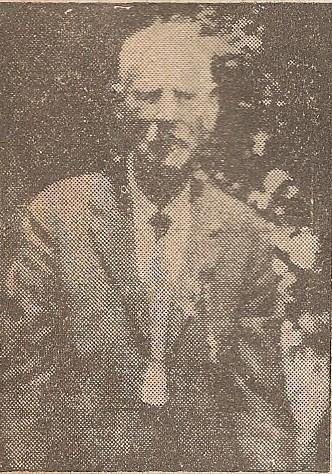
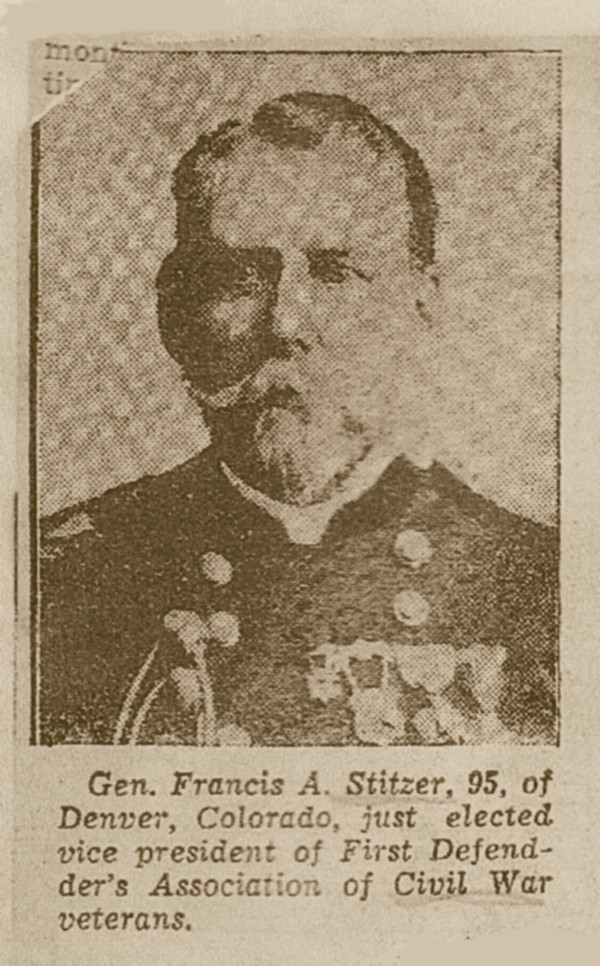
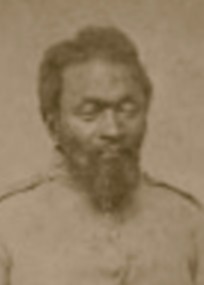
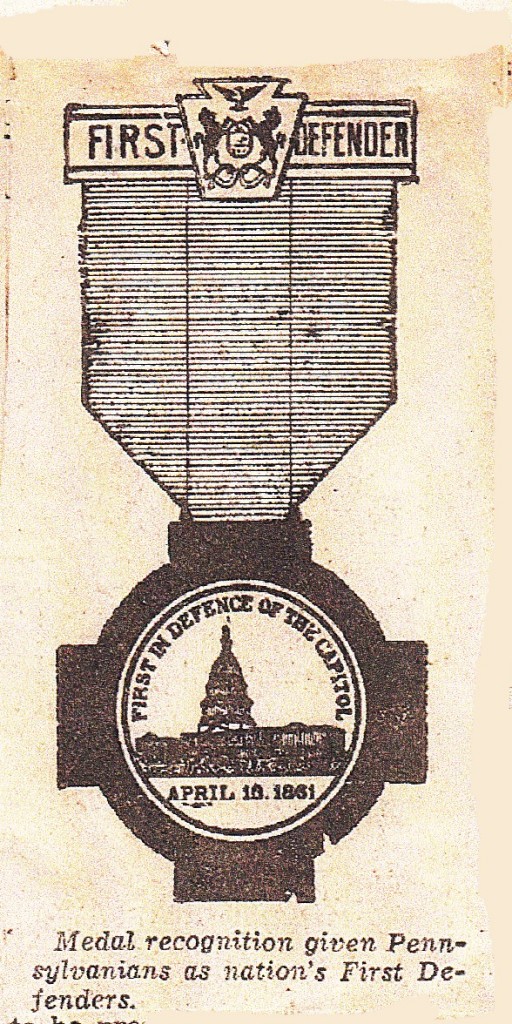
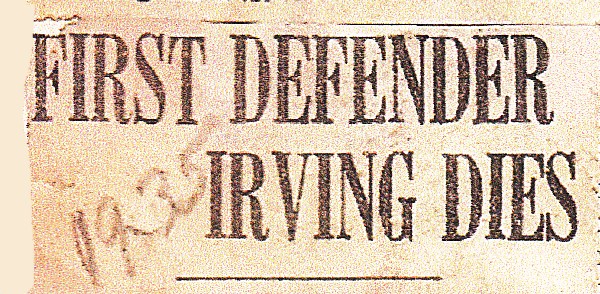


My great grandfather John Hartman was a member of the Washington Artillery from Pottsville, PA. He later joined the 96th PA troops and fought in many battles until he was wounded at Spotsylvania, VA.
After the war he moved to CO and homsteaded in Douglas, County. I do have a photo of him in uniform. He looks old in the picture but I don’t know when it was taken. He died in 1896 and is buried in Sedalia, CO.
I wonder if anyone knows more about this John Hartman.
Myrle Theimer
Billings, MT